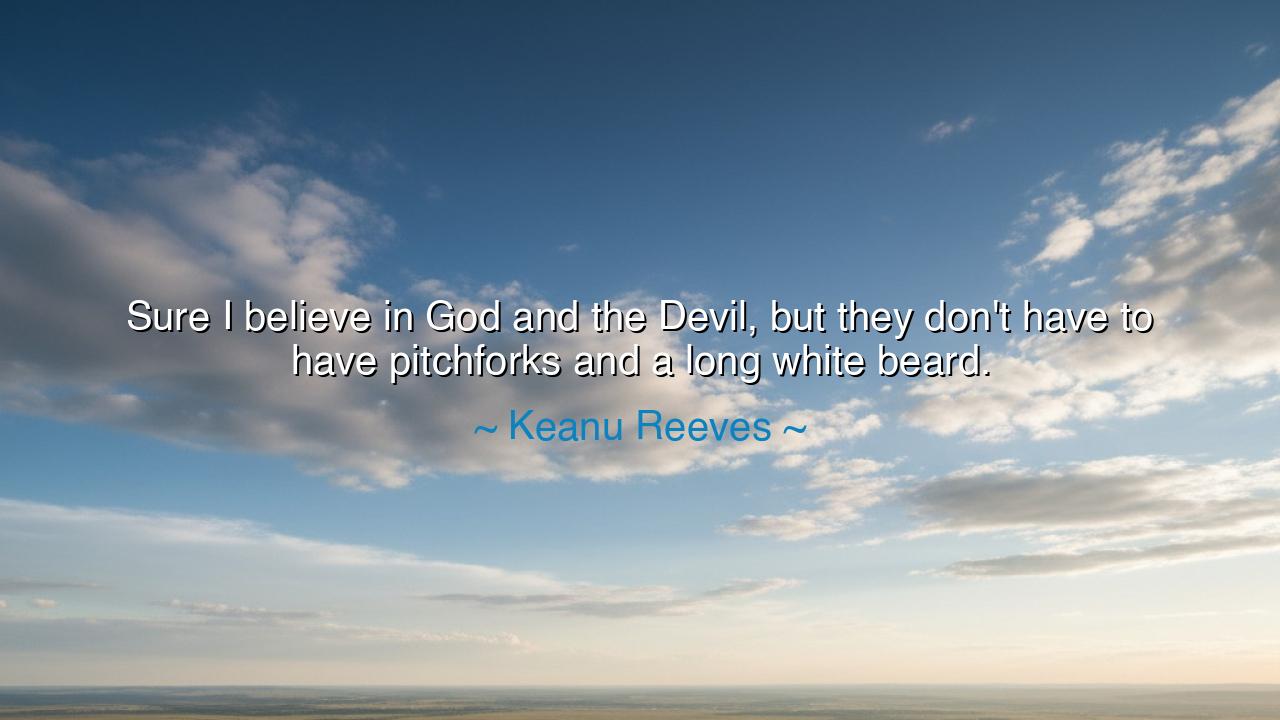
Sure I believe in God and the Devil, but they don't have to have
Sure I believe in God and the Devil, but they don't have to have pitchforks and a long white beard.






The words of Keanu Reeves, a man known as much for his humility and quiet depth as for his art, carry a contemplative and timeless truth: “Sure I believe in God and the Devil, but they don’t have to have pitchforks and a long white beard.” In this reflection, Reeves reminds us that the sacred and the sinister are not distant figures clothed in myth, but living forces woven through the choices, desires, and conflicts within the human soul. God and the Devil, he implies, are not theatrical symbols to be found only in scripture or superstition, but living realities reflected in our actions, thoughts, and the moral fabric of our world.
The origin of this quote can be traced to Reeves’ deep engagement with spiritual and philosophical ideas, shaped by both personal loss and his roles in film. Having portrayed figures who grapple with questions of faith and morality—such as John Constantine, who walks between heaven and hell—Reeves came to see good and evil not as distant abstractions but as forces present in daily human experience. His statement rejects the caricature of religion as mere imagery and invites a deeper understanding: that divine and demonic principles live not above or below us, but within us.
At the heart of his insight is the recognition that God and the Devil are symbols of moral polarity, not physical entities bound by form. The “pitchforks and long white beard” represent the limited human imagination—the tendency to externalize what exists inwardly. Reeves teaches that good and evil are not confined to mythology or distant heavens, but manifest through the choices of men and women: through compassion or cruelty, forgiveness or vengeance, creation or destruction. When we act with integrity, we reflect the divine; when we betray truth, we echo the demonic. Thus, morality is not a cosmic play acted by gods and monsters, but a living drama within the human heart.
History offers vivid illustration of this truth. Consider Oskar Schindler, a man once driven by profit and ambition, who transformed into a protector of the persecuted during the Holocaust. Within him, as within all men, dwelled both the potential for greed and the capacity for grace. His redemption reveals that the divine spark triumphs when conscience conquers fear. Conversely, history’s tyrants—those who justified cruelty under banners of pride or ideology—embodied the opposite force, not because horns adorned their heads, but because they allowed darkness to rule their hearts. The battle between God and the Devil, therefore, is not fought with fire and brimstone, but within the unseen chambers of the human spirit.
Emotion flows deeply through Reeves’ words because they strip away illusion and call humanity to self-awareness. When he speaks of God and the Devil without image or ornament, he invites us to perceive them not as myths but as energies, as living truths expressed in love and hatred, creation and decay. His tone carries neither judgment nor dogma; it is the wisdom of one who has observed life’s beauty and tragedy and found that the divine and the demonic often share the same stage, divided only by intention.
The lesson, then, is both spiritual and practical. Seek to recognize these forces in your own life. The God within calls you to empathy, honesty, humility, and service; the Devil within whispers of envy, deception, and pride. Every choice, every word, and every silence becomes a moment of worship or rebellion. The ancient battleground of heaven and hell is not elsewhere—it is the conscience, the mind, the very breath of the living. To live consciously is to wage that battle daily, and to choose light over shadow, however subtly the conflict appears.
Practically, one must cultivate awareness and integrity. Do not imagine good and evil as distant mythologies, but as choices woven through ordinary moments: in how you treat others, in what you build, in the truths you defend. The greatest act of faith is not to fear devils in the dark, but to confront the darkness within oneself with courage and compassion. In this, we discover that the image of God and the face of the Devil are mirrors, reflecting what we become when we act—or fail to act—in truth.
Thus, the words of Keanu Reeves endure not as a rejection of faith, but as a reawakening of it: “Sure I believe in God and the Devil, but they don’t have to have pitchforks and a long white beard.” Let them remind us that divinity and darkness dwell not in mythic symbols, but in the daily decisions of human beings. Live, then, with awareness; act with love; and remember that the shape of God or the Devil is not found in the heavens or the underworld, but in the soul that chooses its path with every breath.






AAdministratorAdministrator
Welcome, honored guests. Please leave a comment, we will respond soon